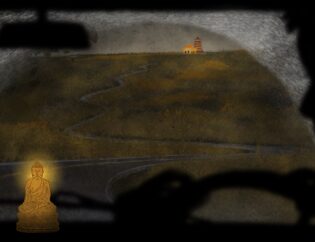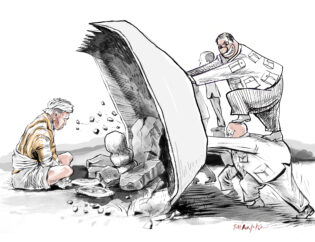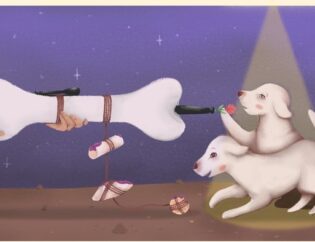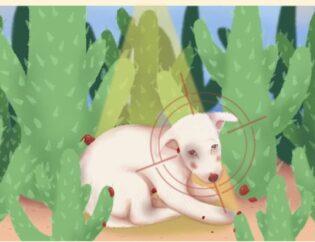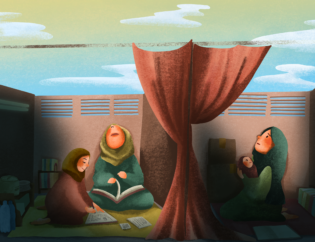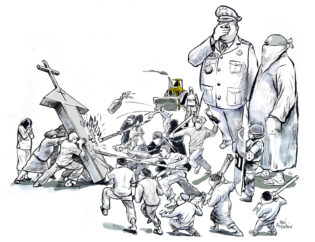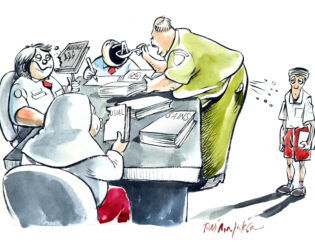Why am I still in Aceh?
Linda Christanty
Mon, 21 January 2008
MY FIRST Acehnese friend was Dewi Sartika. She was a student at the Faculty of Dentistry, Padjadjaran University, Bandung. The acquaintanceship was due to circumstances. We lived in the same boarding house.
MY FIRST Acehnese friend was Dewi Sartika. She was a student at the Faculty of Dentistry,PadjadjaranUniversityBandung. The acquaintanceship was due to circumstances. We lived in the same boarding house. The boarders were usually students or employees, except I and another friend who were still in the high school. At the boarding house, we were often called “greenies”, which meant that our opinions were rarely heard because we were young and inexperienced.
Dewi liked to use jicama mask. White. Thick. The mask made her face look like a wooden face, and the only sign of life was the pair of eyes that blinked at the hollows of the mask.
I always came across Dewi at the passage going to the bathroom every day. Her left hand carried a small pail containing a bar of soap, a bottle of shampoo, toothpaste, toothbrush, razor, a bottle of rice-powder scrub, and god-knows-what-else; while a towel would hang over her right arm. Her petite figure would be wrapped in a pink bathroom kimono. She walked in small and quick steps. Her face was as white as the wall paint. She had a high ambition to wipe off all the pimples that seemed to be comfortably settling down on her face and unsparingly multiplied. I hardly saw the face behind the mask. Dewi used the mask almost every day. Morning, afternoon, evening, night. The real face would be revealed purely for official purposes, namely at the university. It was as if she lead a double life, with two different faces.
My room and Dewi’s room were in the same row, although they were separated by a door that divided the main house and the rear. My room was situated in the main house, Dewi’s was at the back. The costs were the same. Living at the back area of the house was actually more comfortable. You did not have to make platitudes with the nosy pair who took care of the boarding house. Or you could go out or in any time you wanted, without having to worry about disturbing other boarders with the buzzing of the doorbell in the middle of the night or at dawn.
Dewi often came home at dawn. “Busy at the lab,” she would explain. I called her ‘mbak’, although she was not Javanese. Mbak means sister at Javanese languange. She did not mind if I called her so. Ah, yes, Dewi Sartika was also the name of a heroine from West Java who fought for the progress of women through education. For some reasons, Dewi’s parents had not named her after an Acehnese heroine such as Malahayati or (Cut) Meutiah.
For some reasons, people do not refuse to be called ‘mbak’ or ‘mas’ when they are on Java, although they are not Javanese. Probably they are practicing the proverb “When in Rome, do as Romans do.” Settlers must be skillful in adapting to the new environments. Probably there are those who wish not to be called ‘mbak’ or ‘mas’, but do not want to argue or do not feel like reasoning with others. Perhaps they are looking for a safe way out. Probably Javanism has infiltrated through ways that seem to be apolitical, peaceful, and not revealing the opposition between the center (Java) and the margins (regions or islands outside Java). The acceptance toward the address system precisely shows the power relation. I, who come from Sumatra, address people with ‘mbak’ or ‘mas’ when I am in Lombok or Bali, for example. Conversely, people outside Java call me ‘mbak’.
One day, news spread that Dewi went head over heels for a man. The man rejected her, but she would not take no for an answer. “You’ve got to understand, she’s from Aceh, she doesn’t give up, just like Cut Nyak Dien,” another boarder commented, referring to another Acehnese heroine.
Dewi told me once about the Gerakan Aceh Merdeka (GAM – Free Aceh Movement), albeit only fleetingly. The movements existed only deep in the regions, in remote villages. In such places, there were virtually no developments, and poverty reigned. People became disappointed, then they took up guns. They fought against Jakarta, against Java.
I have friends from many ethnic groups. Batak, Riau, Palembang, Bugis, Buton… They generally dislike Javanese. Because Javanese are everywhere (due to the transmigration policy). Also, because they are hard workers (at least according to some of my non-Javanese friends. As far as I know, there are also many lazy Javanese), the Javanese can become richer than the locals.
In any case, the Suharto regime had played a significant role in inciting ethnic sentiments against the Javanese. Suharto had the ambition to Javanize the Indonesian archipelago. During his regime, governors in all the provinces had to be Javanese and with a military background. Centralism reigned. This, naturally, was akin to setting a fire under a haystack. In Aceh, the Free Aceh Movement fought against what Hasan Tiro—the one who came up with the idea of the liberation of Aceh—called as Javanese colonialism.
Conversely, one Javanese friend of mine dislikes Batak people. When she spoon-feeds her child, she would say, “If you don’t want to eat, I’d call a Batak guy to come here.” The child in the cradle would instantly cry. The child will stop crying only after the mother promises her that she would not call the Batak guy, as long as she swallows the food. How does a two-year-old toddler imagine a Batak person; what kind of image would make a toddler cry her breath out?
When did a ethnic plant the seed of hatred toward another ethnic? Probably long before the state of Indonesia existed. At the time, the economic interest of those in power caused them to want to hold back the repressed from becoming united and going against them. Hatred toward a certain race or ethnic group is not something given, it had not been inherent when we were born; rather, it is taught and handed down by something bigger, in the name of the desire to be in power. It is bequeathed, from one generation to the next.
As a child, I hated the Jews. The Koran says that they are a cursed folk, and they deserve our hatred. In reality, the state of Israel robs the Palestinians of their land. My hatred toward the Jews intensified. One day, after watching on TV the incessant battles between the two nations, I thought: can it be true that we must wipe out one folk to find a way out of the war? Should the Palestinians destroy the Jews? I suppose this would be a cruel way out. I cannot accept the annihilation of the Jews, although I hate the Israeli government. My consciousness cannot justify the annihilation of any nation on earth, including the jinn nation. Were all religions to allow the extermination of human folk, I would choose to create my own religion. I think, why don’t we fairly divide the contested land between Palestine and Israel, in the sense that the division would take into account the fertile and the barren areas, and those rich and lacking in natural resources. This division of assets must also consider the number of citizens of each nation, as well as their economic class. Therefore, the war can be concluded.
Furthermore, the ancestors of the Palestinians and Israelites had been the two brothers, Ishmael and Isaac, sons of Abraham. This was first a civil war, a war between brothers, before it was made complicated by the external meddling, the interest of modern arms industry, and the fight over oil fields.
I DID NOT see Dewi again after I finished high school. I left Bandung and studied in Jakarta. We never saw each other again. Sometimes I wonder: does she still use the jicama mask all day? Twenty years have passed. I hope she is well.
As a university student, I habitually read news on GAM in magazines or newspaper. Naturally, GAM was always portrayed as something bad. Reporters presented no quotes from inside the GAM. All sources were either the Indonesian military or government. One day, the government and the military tagged this anti-Jakarta movement or organization as troublemakers or Gerakan Pengacau Keamanan—which literally meant “Disorder-Causing Movement” or GPK for short. A Koranic reciting group in Lampung that refused to ask permission from the government to carry out its activity was labeled as ‘GPK Lampung’—or ‘GPK Warsidi,’ from the eponymous leader of the group. Hundreds of citizens who joined the reciting group were massacred in a military operation, which would subsequently be known as the Talangsari tragedy. The GAM in Aceh was then called the GPK Aceh or GPK Hasan Tiro.
My second Acehnese friend was Helmi Mahadi. He was one of the best friends I have ever had. We met in Yogyakarta in 2001. He started a publishing house and produced books written by his friends. Helmi had a noble goal. He wanted the publishing house to last long, without having to be preoccupied with profits.
“I’d raise poultry if needs be, just to support the publishing house,” he said.
The noble goal came into conflict with parental wishes. The parents urged Helmi to get married. They wanted Helmi to come back to Aceh.
“If I really had to go back to Aceh, I’d ask them to prepare boots and uniforms with GAM’s coat of arms. They must certainly be in a special size, as my build is below average. The usual uniform would be too big for me,” he said jokingly.
One day a friend told me that Helmi had become depressed. He was treated in a mental hospital in Yogyakarta, Central Java, and then his family took him home to Aceh. Then he was detained for two weeks by the Indonesian military because he claimed that he was a member of the Free Aceh Movement. At the time, Aceh was still in the military emergency status. It was still a closed area.
Aceh became more open when I joinedPantaumagazine and wrote for them in 1999. I met Acehnese writers such as Chik Rini. Although she had a Javanese mother and a father from Palembang (South Sumatra), she grew up in Aceh. Rini wrote about Aceh with a point of view that was distinct from that of the media in Jakarta. Her sources were more varied. Rini disliked GAM, but she was fair. She interviewed the GAM, the Indonesian military, and common people. Her writing was in no way judgmental.
One day, after the tsunami hit Aceh, I was posted in Aceh. I had to establish a news agency, observe aid agencies and peace organizations. It was not an easy task, especially for a single person. I called my younger brother, asking him his opinion.
“Just go, Sis. Don’t be afraid. Our ancestor had been in Aceh; Syekh Yusuf once studied in Kutaraja with several ulemas there. He also met Syiah Kuala. They became good friends and studied together in Mecca. So, Aceh is your second home,” my brother said.
Syekh Yusuf Al Makassari or Muhammad Yusuf was a religious leader and a commander at the Sultanate of Banten. He was captured by the Dutch and exiled to Sri Lanka in 1683, then banished to Cape Town, Africa. In our family tree, I am Yusuf’s eight descendant, from my father’s line.
Suddenly I felt that I was going home. I have loved Aceh before I came.
Today I have been in Aceh for almost a year. I think I have not done much here. Post-conflict and post-tsunami reconstructions and rehabilitations went in fits and starts. The building of houses for the people is still far from the finished target. There are still tens of thousands of tsunami survivors who lived in barracks. Peace has not been fully established. In early July 2006, the military shot dead civilians right before the representatives of the Aceh Monitoring Mission (AMM), the team that observed the implementation of the Helsinki Pledge. According to Pieter Feith, who led the AMM team, the Paya Bakong incident (in North Aceh) was only one of a score of violent cases involving the Indonesian military after the Helsinki Pledge.
The crime rate is higher than that during the war. Unemployment rises. Prices increase, as money is plentiful.
People from many nations gather in Aceh. They work as volunteers, staff members or directors of aid agencies. On the one hand, business bloomed because of them; on the other hand, many people were still lacking in many things.
How about the syaria law? Honestly, the application of this law only serves to put the Acehnese in further misery. Seventh century law is imposed on today’s lives. Syaria police are busy chasing sinful people, but then they watch the sinful acts themselves. Is that not a sin, according to the religion? How would they punish themselves, then? I would like to know the personal life of each of the syaria police officers. Are they truly as pure as babies? I would love to know. Furthermore, I would like to know the personal lives and background of the initiators or supporters of the syaria law in Aceh.
I remember still the story about Abraham, the ancestor of Mohammad’s and of other prophets before him. He deliberately destroyed the sculptures his ancestors had worshipped. Why should one worship sculptures that could neither talk nor help themselves? Abraham was brilliant, brave, and extraordinary. The story shows that religion is not a lifeless ideology; rather, it is open for corrections or even rejuvenations. Religion must be able to provide peace and comfort for the believers, instead of causing fear and depression.
The story of Aceh today is that of fear and depression. Conflict, disaster, then the syaria law…
Not long ago, Insan Cinta Madani Foundation, a non-governmental organization in Aceh, wished to know the opinion among the Acehnese regarding the implementation of the syaria law. They made researches, distributed questionnaires. So far, acts and law have been implemented in Indonesia without regards to the public opinion. Syaria law had already been implemented, but why should we not know what the people really wanted, deep down in their hearts? Majelis Permusyawaratan Ulama Aceh, a group of Islamic leader in Aceh, however, urged the people not to answer the questionnaire. Why? What if the research shows that the Acehnese do not wish the syaria law to be implemented there? Can one human institution then accuse them of opposing Islam and determine that they would go to hell? Naturally it cannot, and indeed it is not able to do so. The Koran has mentioned that matters of heaven and hell strictly belong to Him; they are God’s secrets. It is not up to the humans to determine whether someone is going to heaven or hell. It is not our right!
The air in Banda Aceh, the capital of Aceh, is very dusty today. Many trees fell down because of the tsunami. There are no adequate barriers against dust. Not enough water absorbers. Thus the flood hit Lhokseumawe, North Aceh, and Tamiang, which lies at the border with North Sumatra. On the one hand, trees must be felled to provide timbers to build houses for the people who lost their homes in the earthquake and tsunami. On the other hand, the damaged ecosystem brings a new disaster.
The gutters are full of garbage. Probably people in Aceh have no concept about cleanliness, I thought to myself. Probably poverty and the protracted war make people have no time to take care of themselves. When he declared the inception of the Free Aceh Movement for the first time in 1976, Hasan Tiro did not only teach the Acehnese how to use their weapons to fight the state of Indonesia; he also tried hard to teach them about hygiene. Tiro taught the Acehnese to wear clean and tidy clothes, and to brush their teeth after meals.
Yes, from today on, the Acehnese must learn to manage their lives. To be able to manage the bigger things, one must start from the small ones, namely from oneself. A conscientious attitude must be applied to clean up the houses, clean up the gutters, clean up the rivers, clean up the beaches, and work hard for the future. We have to be our own masters as well as helpers.
I want to stay longer in Aceh. I want to see the region rise from the rubbles of war and disaster, because this is my second home. I also want to find Helmi, my best friend. News about him is still unclear. Some said that he survived the tsunami, but then disappeared. I also heard that he taught at a school established byRepublika, a Jakarta daily. I shall find him. ***
December, 2006
*) Linda Christanty is a writer and journalist. She is editor in chief in the Pantau News Agency (Pantau Foundation) Aceh.
**)Translated by Rani Elsanti


